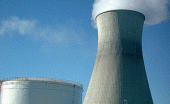Johannah Bernstein post: "eternally proud of my father’s extraordinary aeronautical engineering. legacy. here is a photo of the Canadair Water…
Energy Markets or Energy Governance?
Written by Diana Thebaud Nicholson // November 12, 2011 // Bert Revenaz, Economy, Environment & Energy, Government & Governance, Guy Stanley // Comments Off on Energy Markets or Energy Governance?
Javier Solana, former High Representative for Foreign Affairs and Common Security Policy of the European Union and former Secretary General of NATO, and Ángel Saz-Carranza is Coordinator of ESADEgeo.
… Other, more immediate crises are occupying the world’s attention almost completely, distracting governments and citizens alike from the energy challenges that are still before us. In the United States, there has been no energy debate at the federal level for a long time; the European Union is in the eye of a financial hurricane; and the emerging countries want to maintain rapid economic growth in order to lift millions out of poverty. In this context, the next meeting of the United Nations Framework Convention on Climate Change (UNFCCC), set for the end of November in Durban, South Africa, is passing totally unnoticed.
But energy is fundamental for humanity, not only because of its potentially negative externalities, but also given its economic relevance: Western countries spend 8-10% of their GDP on energy, and developing countries spend double or triple that amount. For this reason, we need a system to govern energy.
Owing mainly to its environmentally negative externalities, an unregulated energy market is not a useful governing mechanism, because it is unable to internalize the environmental costs. It has been calculated that the most contaminating energy sources would have to pay a 70% tax to reflect their negative externalities.
A substantial lack of information in this field is another reason why the free market doesn’t work. Often, as with the properties of a gas reserve, for example, information is technically difficult to obtain. In addition, governments consider natural resources to be strategic and don’t release information about them. Finally, time frames related to energy are usually long: centuries for environmental effects or decades for investments to pay off. Thus, energy must be governed through a system of cooperation and regulation Full article at Project Syndicate
Bert Revenaz:
Whenever I hear that we are drilling and extracting oil “to increase our reserves”, I hear “war is peace; freedom is slavery”
Calling oil/coal/natural gas extraction “production” is simply wrong. When a company removes inventory (oil) from its warehouses (oil deposits) that took years to manufacture, no one calls it production, it is called distribution, and whatever goes out the door is removed from the balance sheet and from inventory.
I can just see our accountants’ and auditors’ reaction if we tried to pass off the shipping of goods as production.
Oil companies are essentially forklift operators that go around a giant warehouse (the earth) locating the goods to be shipped (oil), packaging it and shipping it. It just so happens that this warehouse is extremely poorly organized and that the goods are spread far and wide on very hard to reach shelves. It has no computerized inventory and all paper records were lost, so tremendous resources have to be expanded in searching for the goods and retrieving them.
But the oil industry is and always will be simply removing oil from inventory and shipping it, only very twisted logic would lead someone to think of it as producing something.
Guy Stanley
Hi Douglas,
It’s true that the richest countries have the most efficient economies, for lots of reasons besides energy costs. I think one interesting aspect of the “green” critique of market economies is the observation that markets generally underprice energy, especially from hydrocarbons. If the theory that such energy sources took millions of years to produce is correct and that after only a 100 years or so we’re approaching peak supply conditions if we haven’t already reached them, then this is a sign that these sources were priced WAY below replacement values, even despite depletion allowances for oil companies. When “externalities” such as carbon release to the atmosphere is factored in, then it’s equally clear that market prices are inducing climatological suicide with these giveaway levels. In a world of limited resources, efficient prices should cover replacement or substitutions. They clearly don’t, if the greens and climate changers are right–and this now appears to be “settled” science–hence the problems. It’s a fundamental accounting problem as “nature” is treated as “free” in all accounting standards that I’m aware of, anyway. Exploration costs are recoverable and spillover “damage” is “compensated”, but these are not the same thing as full replacement.
Douglas Lightfoot:
Javier Solana as part of the Spanish government is partly responsible for the current mess in Spanish energy supply. Large wind and solar power costs are the reason for (a) Spain having the highest electricity costs in Europe and (b) Spain being close to next on the list for a European bailout.
As far as I have been able to determine, the Climate Change conference in November in Durban has little, if anything, to do with energy.
The fact is that the nations that use the most energy have the cleanest air, best drinking water, safe and abundant food and a host of other good things. Thus, when fossil fuels, which are strong and concentrated energies, become scarce and there is no replacement of sufficient size, there will be a problem.
Why would the decisions in the US re energy policy be changed by more regulation? The problems with energy policy in the US are not related to regulation. Large subsidies for wind power are the result of lobbying. One reason the rate of adoption of nuclear is slow is because the price of natural gas is very low, and supplies are deemed to be adequate for decades. Opposition to the Keystone pipeline will not change because of regulation – it is an emotional issue.
(I would much rather have the pipeline go to eastern Canada and the offshore oil we buy sent to Texas. We would then have more control over our own supply of liquid fuels for air, road and off-road transport. The latter is for the farmer who grows your food.)



